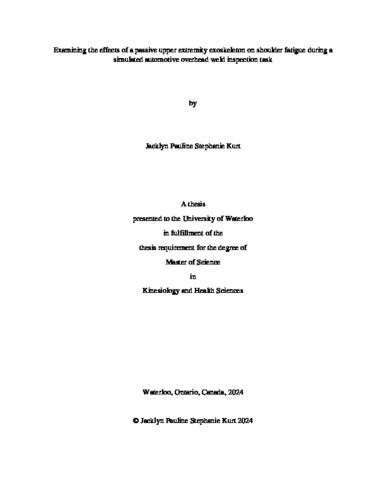| dc.description.abstract | Exoskeletons are emerging as occupational assistive devices, and in particular passive upper extremity exoskeletons have been implemented in workplaces in situations where it is not possible to remove overhead work job elements. Previous studies have commonly reported the effects of exoskeleton usage on the deltoid muscles during short duration tasks, but these data incompletely characterized how exoskeletons may influence shoulder fatigue development and subsequent injury risk. The main purpose of this thesis was to quantify the exoskeleton’s impact on psychophysical, localized muscle, and strength measures of fatigue in the shoulder throughout a two-hour simulated welding task. Ten male participants completed two in-lab sessions of the same task with and without the exoskeleton. Psychophysical measures of exertion, shoulder, elbow, and wrist discomfort were recorded along with surface electromyography (EMG) from bilateral supraspinatus, infraspinatus, upper trapezius, anterior and middle deltoids using a posture-controlled weighted reference task to calculate changes in mean power frequency (MPF) every 10 minutes throughout the 2-hour protocol. Maximum voluntary strength efforts (abduction and external rotation) were completed every 20 minutes to monitor changes in strength. The left and right sides were compared over time to assess potential changes in strategy throughout the task progression. The absence of significant hand by time interactions indicated there was no systematic change in strategy throughout the task protocol. The overhead weld inspection task caused increased markers of fatigue (decreased MPF) in the supraspinatus, infraspinatus, and upper trapezius over the 2-hour protocol. Wearing the exoskeleton resulted in significantly higher MPF compared to no exoskeleton in the supraspinatus (p<0.001), infraspinatus (p<0.001), and upper trapezius (p<0.001), with measures remaining at baseline in the EXO group, indicating a lack of fatigue development. Shoulder discomfort was reduced by 0.67 points (EXO = 1.97, NE = 2.64) when wearing the exoskeleton. Additionally, wrist discomfort was 0.4 points lower without the exoskeleton (EXO = 1.06, NE = 0.66), suggesting that the wrist and other body regions that are not targeted by the exoskeleton should be monitored if these devices are implemented. External rotation force was also lower with the exoskeleton than without, driven by a decrease in force output at the start of the collection period that returned to baseline values by the end of the 2-hour protocol. This could indicate that the exoskeleton may have affected cognitive fatigue in these non-expert users; however, cognitive fatigue was not directly measured in this thesis and should be investigated further in future work. Overall, this thesis provides novel findings regarding the effects of a passive upper extremity exoskeleton on muscular fatigue, particularly in the glenohumeral stabilizing muscles (supraspinatus, infraspinatus, and upper trapezius). This had not been previously explored during an extended duration task representative of the workplace. | en |

